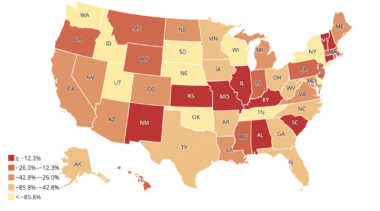-
How to reform the FDA
Reimagining pharmaceutical regulation, so it better serves society’s needs by encouraging widespread availability of life-saving drugs at lower prices.
-
The case for interstate marijuana commerce right now
Pathways to establishing an interstate marketplace for marijuana.
-
Marijuana Taxation and Black Market Crowd-Out
Tax rates that elevate the price of legal marijuana significantly above black market prices prolong the presence of illegal markets and reduce government tax receipts.
-
The impact of California’s cannabis taxes on participation within the legal market
This analysis develops an empirical model to estimate the degree to which California’s tax regime affects participation within its commercial cannabis market, and how participation may change through different approaches to taxation.
-
Social equity programs in marijuana legalization laws aren’t achieving goals of helping victims of the drug war
State efforts to promote social equity within legal cannabis markets have unintentionally created new versions of the war on drugs.
-
Drug Legalization Handbook
"America needs to recognize that we will not see a reduction in violent crimes until we legalize drugs. All drugs."
-
State debt: California, Illinois, New York, New Jersey and Texas each have over $200 billion in total liabilities
On a per capita basis, Connecticut's $27,031 total liabilities per capita are worst in the nation, followed by New Jersey.
-
County debt: Los Angeles, Miami-Dade and Cook counties among worst in nation
Los Angeles County had $54 billion in liabilities at the end of 2022. Miami-Dade County had $29 billion in total liabilities.
-
City debt: New York has more than four times the liabilities of Chicago, Los Angeles, Houston and other cities
New York City, the District of Columbia, Chicago, Atlanta, Yonkers and Austin have the most per capita liabilities.
-
Continuing Reform: Challenges Persist With the Florida Retirement System (FRS)
The retirement benefits ultimately received by members of both plans within FRS will come at an ever-increasing cost to taxpayers and other public services if needed technical adjustments to both plans go neglected.
-
North Carolina Teachers’ and State Employees’ Retirement System: A Pension Solvency Analysis
Better risk management and more realistic plan assumptions can help ensure the state delivers the promised retirement benefits to its employees.
-
The Economics of Space: An Industry Ready to Launch
Here are cooperative ways for government agencies and the private sector to promote widespread commercialization of space transportation and accelerate the pace of exploration and economic development of space.
-
Will Democracy Endure Private School Choice? The Effect of the Milwaukee Parental Choice Program on Adult Voting Behavior
These findings suggest that the private benefits attained by students using voucher programs do not come with any social costs associated with diminished voting behavior.
-
Deal or No Deal? The Effects of Deregulation on Public School Leaders’ Support for Private School Choice in California
Public school leaders might be more likely to support private school voucher programs if they are enacted alongside public school deregulations.
-
The Impact of Regulatory Compliance Costs on Private School Participation in Voucher Programs
More specialized private schools tend to be less likely to participate in voucher programs than regular private schools.
-
An Analysis of K-12 Student Safety Policies and School Climates in Indiana
Results suggest that private schools and public charter schools are less likely to use school safety practices that restrict students than are traditional public schools.
-
Working Paper: Access To Private Schools And Public Charter Schools Might Improve Parent And Student Satisfaction
Public charter schools and private schools outperform traditional public schools on six measures of parent and student satisfaction.
-
The Economic Impacts of School Choice in Kentucky
This report finds that access to public charter schools in Louisville could provide the $138 million in economic benefits from higher lifetime earnings associated with increases in academic achievement.

















